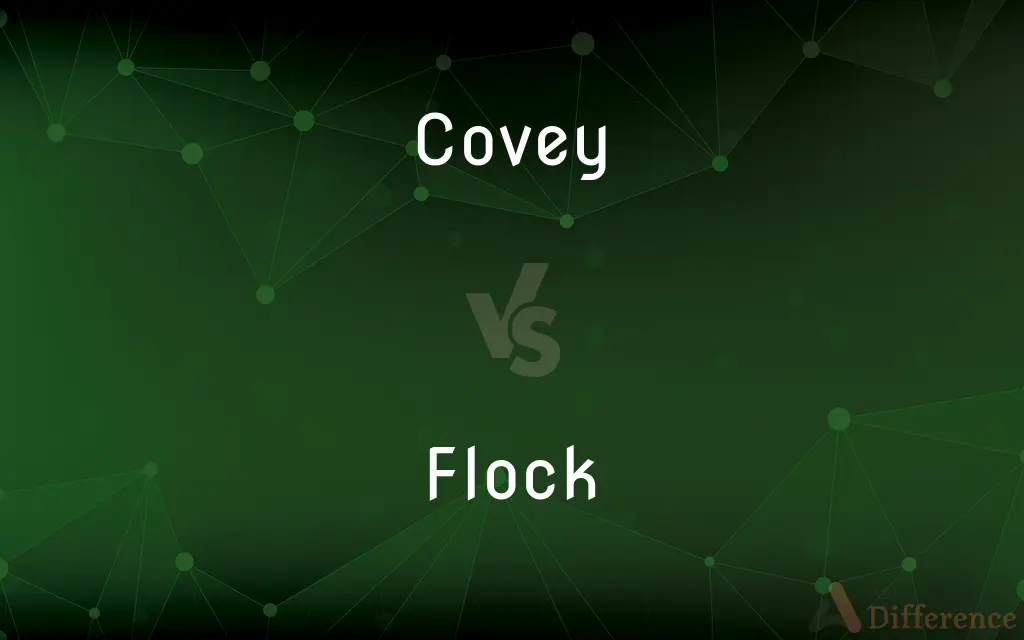Covey vs. Flock — What's the Difference?
By Tayyaba Rehman & Maham Liaqat — Updated on April 22, 2024
Covey typically refers to a small group of birds, especially partridges or quails, while a flock is a larger group of birds or even some other animals, like sheep.

Difference Between Covey and Flock
Table of Contents
ADVERTISEMENT
Key Differences
A covey is generally used to describe a small group of game birds, particularly partridges and quails, that is characterized by a common habitat and behavior. On the other hand, the term flock refers to a much larger and diverse group of birds or even other animals such as sheep or goats, highlighting the term's versatility in animal grouping.
While covey implies a specific kind of bird and a smaller number, a flock is not limited by species or size, often used to describe large congregations of birds like geese or starlings. This distinction highlights how the terms can indicate the size and intimacy of the group.
Covey is often used in the context of hunting and wildlife observation, emphasizing the group's coherence and the way these birds interact with their environment. In contrast, flock is commonly used in both animal husbandry and general observations of animal behavior, showcasing its broader application.
In terms of etymology, "covey" originates from the Old French word "covee," meaning brood, reflecting the term's association with small, familial groupings of birds. Conversely, "flock" derives from the Old English "flocc," related to company or crowd, which supports its use for larger groups.
While a covey specifically refers to a group within a specific context of species, a flock can be used more universally, not just for birds but also for groups of animals like sheep, highlighting its adaptability in various linguistic contexts.
ADVERTISEMENT
Comparison Chart
Size
Small, typically fewer than 20
Large, can be hundreds or thousands
Species Specific
Yes, mainly game birds like partridges and quails
No, includes various birds and some mammals like sheep
Context
Often used in hunting and wildlife observation
Used in broader contexts, including farming
Etymology
From Old French "covee," meaning brood
From Old English "flocc," meaning crowd or company
Usage
More specific and niche
Broad and versatile
Compare with Definitions
Covey
Predominantly used in the context of bird hunting.
Hunters often look for signs of a covey while on a hunt.
Flock
A large group of birds or some types of animals, like sheep.
A flock of geese flew overhead, heading south for the winter.
Covey
Used specifically to describe partridges or quails when in a group.
The hunter was tracking a covey in the woods.
Flock
A universal term applicable to various animals in group settings.
The children watched the flock of pigeons in the square.
Covey
A term often associated with the intimate, familial nature of the grouping.
A covey of partridges huddled together against the cold.
Flock
Implies a broader, more diverse grouping compared to covey.
The birdwatcher enjoyed watching the diverse flock by the lake.
Covey
A small group of birds, especially game birds.
We spotted a covey of quails in the field early in the morning.
Flock
Used to refer to congregating animals or birds in a general sense.
The shepherd gathered his flock before the storm.
Covey
A collective noun for certain birds, emphasizing their collective behavior.
The covey rose in unison, startled by the noise.
Flock
Commonly used in both natural and agricultural settings.
He managed the flock with skill, ensuring none strayed too far.
Covey
A family or small flock of birds, especially partridge or quail.
Flock
A group of animals that live, travel, or feed together.
Covey
A small group, as of persons.
Flock
A group of people under the leadership of one person, especially the members of a church.
Covey
A group of 8–12 (or more) quail.
Flock
A large crowd or number
A flock of visitors.
A flock of questions.
Covey
A brood of partridges, grouse, etc.
Flock
To stuff with waste wool or cotton.
Covey
A party or group (of persons or things).
Flock
To texture or pattern with pulverized wool or felt.
Covey
A man.
Flock
A number of birds together in a group, such as those gathered together for the purpose of migration.
Covey
(intransitive) To brood; to incubate.
Flock
A large number of animals associated together in a group; commonly used of sheep, but dated also used for goats, farmed animals, and a wide variety of animals.
Covey
A brood or hatch of birds; an old bird with her brood of young; hence, a small flock or number of birds together; - said of game; as, a covey of partridges.
Flock
Those served by a particular pastor or shepherd.herd/flock
Covey
A company; a bevy; as, a covey of girls.
Flock
A large number of people.
Covey
A pantry.
Flock
(Christianity) A religious congregation.
Covey
To brood; to incubate.
[Tortoises] covey a whole year before they hatch.
Flock
Coarse tufts of wool or cotton used in bedding.
Covey
A small collection of people
Flock
A lock of wool or hair.
Covey
A small flock of grouse or partridge
Flock
Very fine sifted woollen refuse, especially that from shearing the nap of cloths, formerly used as a coating for wallpaper to give it a velvety or clothlike appearance; also, the dust of vegetable fibre used for a similar purpose.
Flock
(intransitive) To congregate in or head towards a place in large numbers.
People flocked to the cinema to see the new film.
Flock
To flock to; to crowd.
Flock
To treat a pool with chemicals to remove suspended particles.
Flock
(transitive) To coat a surface with dense fibers or particles; especially, to create a dense arrangement of fibers with a desired nap.
The sampling and elution advantages of flocked swabs versus spun swabs
Flock
To cover a Christmas tree with artificial snow.
Flock
A company or collection of living creatures; - especially applied to sheep and birds, rarely to persons or (except in the plural) to cattle and other large animals; as, a flock of ravenous fowl.
The heathen . . . came to Nicanor by flocks.
Flock
A Christian church or congregation; considered in their relation to the pastor, or minister in charge.
As half amazed, half frighted all his flock.
Flock
A lock of wool or hair.
I prythee, Tom, beat Cut's saddle, put a few flocks in the point [pommel].
Flock
Very fine, sifted, woolen refuse, especially that from shearing the nap of cloths, used as a coating for wall paper to give it a velvety or clothlike appearance; also, the dust of vegetable fiber used for a similar purpose.
Flock
To gather in companies or crowds.
Friends daily flock.
Flock
To flock to; to crowd.
Good fellows, trooping, flocked me so.
Flock
To coat with flock, as wall paper; to roughen the surface of (as glass) so as to give an appearance of being covered with fine flock.
Flock
A church congregation guided by a pastor
Flock
A group of birds
Flock
(often followed by `of') a large number or amount or extent;
A batch of letters
A deal of trouble
A lot of money
He made a mint on the stock market
It must have cost plenty
Flock
An orderly crowd;
A troop of children
Flock
A group of sheep or goats
Flock
Move as a crowd or in a group;
Tourists flocked to the shrine where the statue was said to have shed tears
Flock
Come together as in a cluster or flock;
The poets constellate in this town every summer
Common Curiosities
Is covey used outside of hunting contexts?
While mainly used in hunting, covey can also appear in general wildlife observation.
How many animals constitute a flock?
A flock can consist of any large number of animals, usually more than a few dozen.
What does flock mean?
Flock can refer to any large group of birds or certain animals like sheep.
What types of animals are typically included in a flock?
Birds primarily, but also sheep, goats, and sometimes other herd animals.
What is a covey?
A covey refers to a small group of specific game birds, like partridges or quails.
What is the largest size a covey can be?
Coveys are usually less than 20 birds.
Can the term covey be used for birds other than partridges or quails?
Typically, covey is specific to game birds such as partridges and quails.
Why might one choose to use the word flock instead of covey?
Flock is more versatile and can be used to describe a wider range of groupings and species.
What is the best setting to use the term flock in writing?
Flock is suitable for both casual and formal descriptions of animal group behavior.
Are there specific behaviors associated with a covey?
Yes, a covey often exhibits close-knit, familial behaviors and protective strategies.
Can covey refer to a large number of birds?
No, covey is typically reserved for small, specific groups.
Is flock used internationally across English-speaking countries?
Yes, flock is widely understood and used globally in English-speaking regions.
How does the term covey enhance descriptions in birdwatching?
It provides specificity, enhancing understanding of the group's size and species.
What historical significance does the word covey hold?
It has roots in hunting and rural traditions, particularly in Europe.
Does the size of a flock impact its behavior?
Larger flocks can exhibit different collective behaviors and dynamics compared to smaller groups.
Share Your Discovery

Previous Comparison
Solitude vs. Seclusion
Next Comparison
Rate vs. AmountAuthor Spotlight
Written by
Tayyaba RehmanTayyaba Rehman is a distinguished writer, currently serving as a primary contributor to askdifference.com. As a researcher in semantics and etymology, Tayyaba's passion for the complexity of languages and their distinctions has found a perfect home on the platform. Tayyaba delves into the intricacies of language, distinguishing between commonly confused words and phrases, thereby providing clarity for readers worldwide.
Co-written by
Maham Liaqat















































